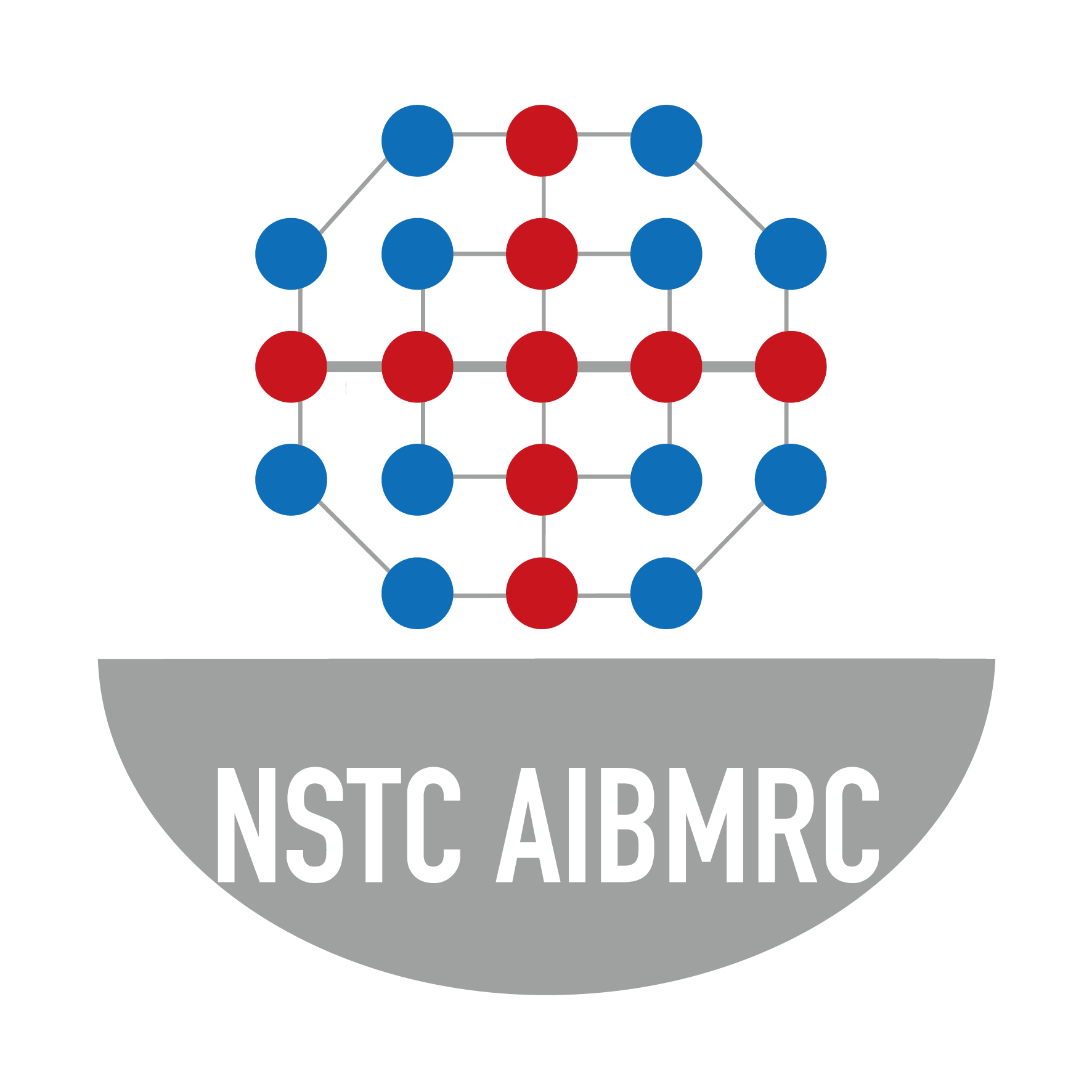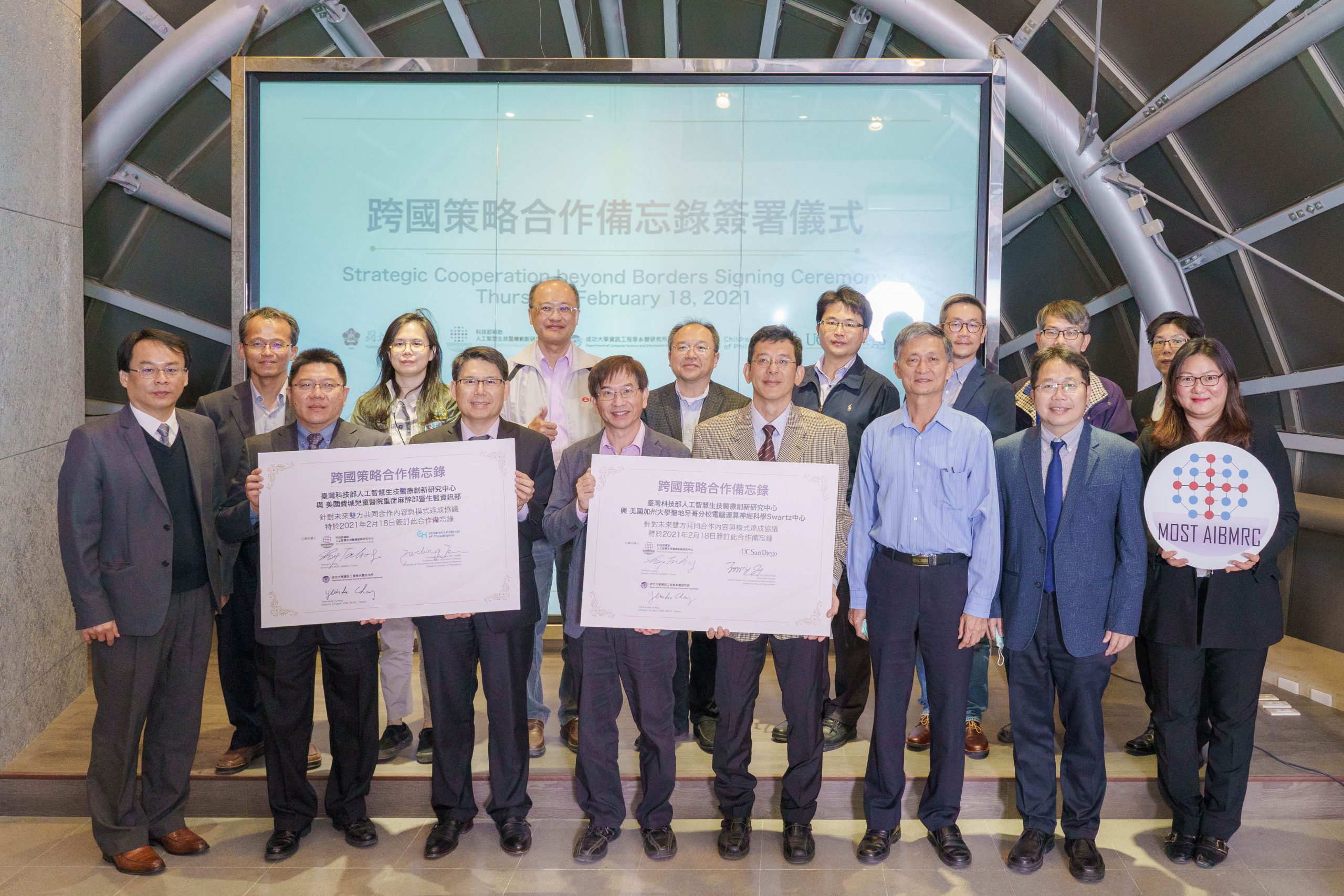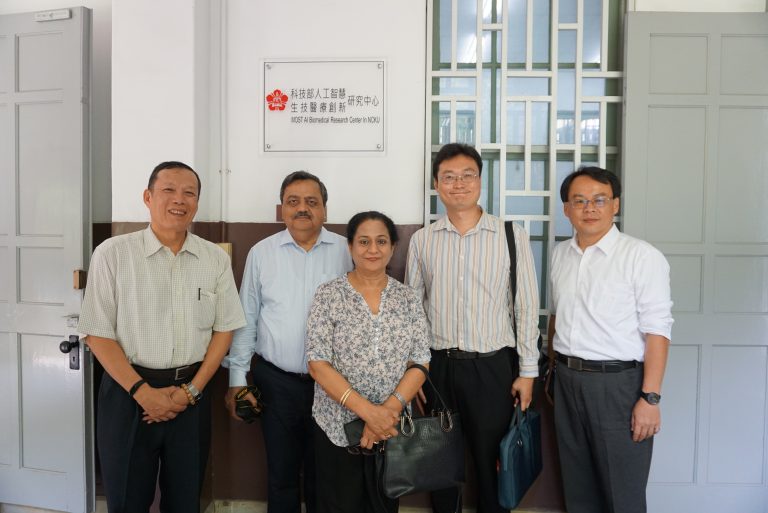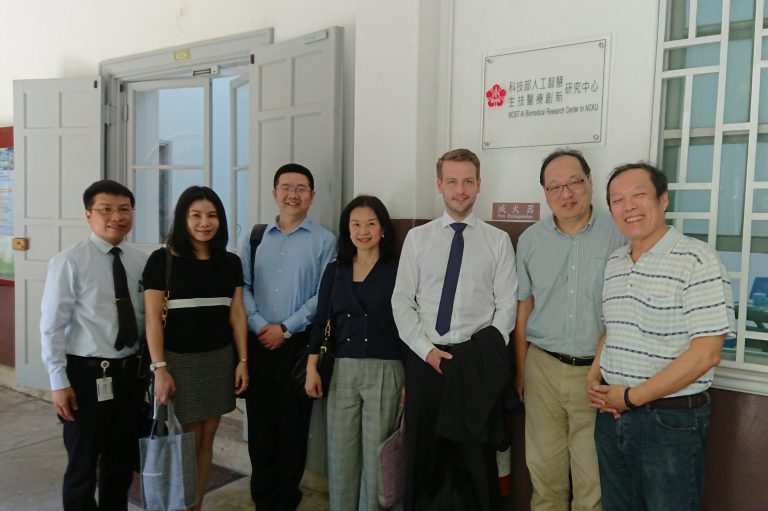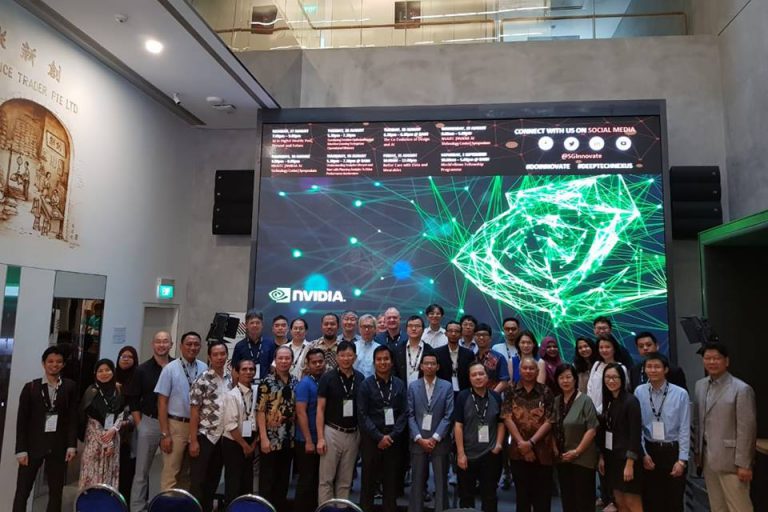Initiating an AI International Talent Launch Pad
MOST AIBMRC & NCKU Dept. of Computer Science & Information Engineering
with Children’s Hospital of Philadelphia and UCSD Swartz Center for Computational Neuroscience Memorandum of Cooperation
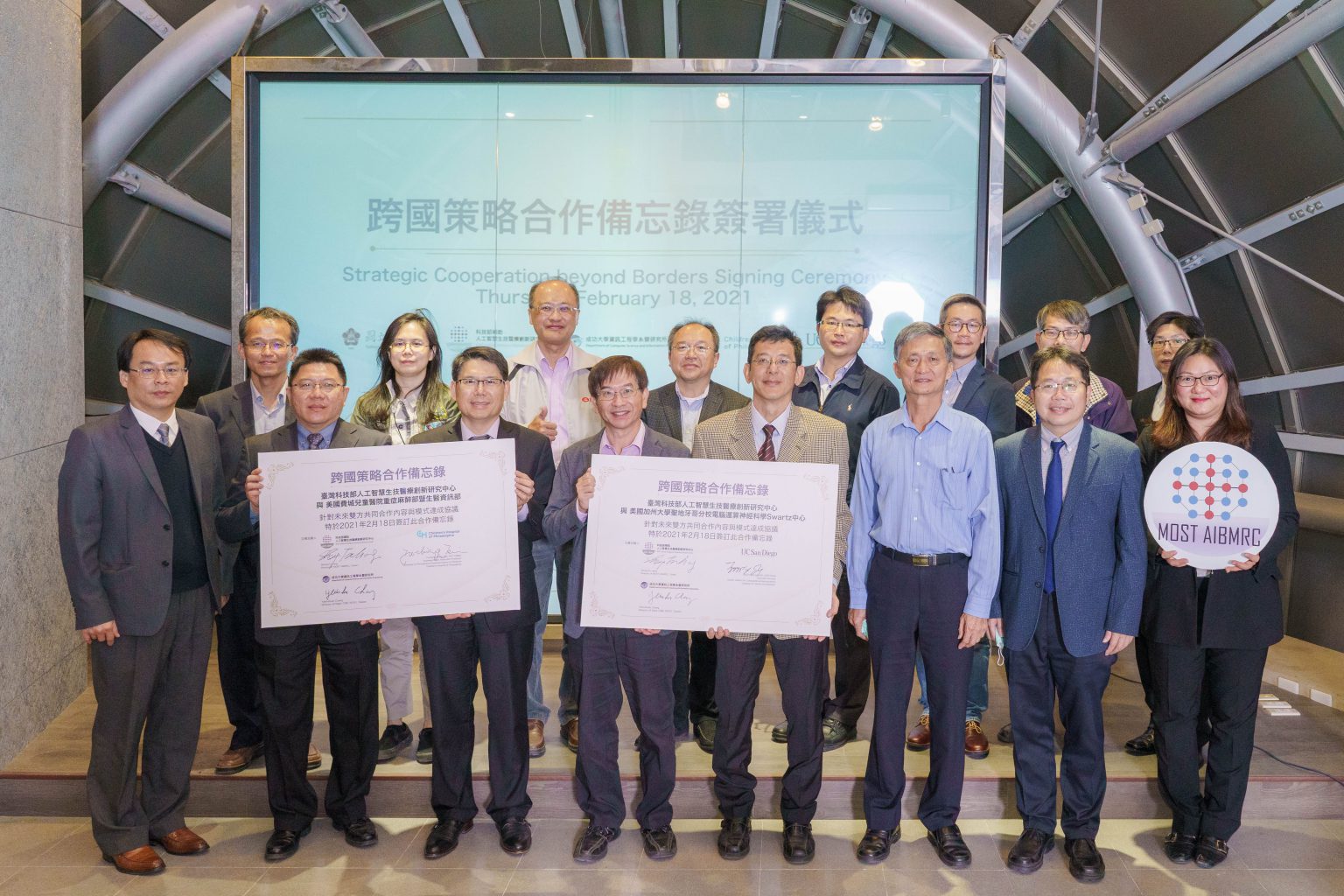
Country of Cooperation
U.S.A.
U.S.A.
Collaborating Partners
University of Pennsylvania’s Perelman School of Medicine & Children’s Hospital of Philadelphia
Swartz Center for Computational Neuroscience at UC San Diego
Areas of Cooperation
Research (internships/exchange students)
Cross-border clinical projects
Cross-border practice fields
AI Biomedical Innovation in Southern Taiwan Globally Expanding it’s International Influence
MOST AIBMRC, NCKU CSIE Dept. and NCKU Institute of Medical Informatics jointly organized the “Artificial and Human Intelligence International Master Forum and Strategic Cooperation beyond Borders Signing Ceremony” at National Cheng Kung University. Since the onset of AI in Taiwan in 2017, the Ministry of Science and Technology has vigorously promoted advanced AI research; shortly after the MOST AIBMRC was established. Since the onset, the center has cultivated top AI talents and technological research & development to meet the needs of industry. The overall goal is to create an AI biomedical innovation ecosystem. Academic research teams under the center lean towards AI biomedicine and biotechnology fields. We ultimately strive to bridge research results to the industry and promote AI solutions to the market and fulfill unmet needs in the biomedical field. This would not only improve the clinical field necessities but also accelerated the creation and verification of AI application technologies. In the past 3+ years, the center has been based in Southern Taiwan and connected with professional medical systems such as NCKU Hospital, KMU Hospital, E-Da Hospital, Chimei Hospital, Taichung Veteran’s Hospital Chiayi branch. A large research alliance formed with the following institutions: NCKU, YMU, NTU, Nat’l Sun Yat-Sen Univ., STUST, Ping Tung Univ., and Nat’l Taiwan Ocean Univ. and linked up with corporations including Southern Taiwan Science Park, Telecom Technology Center, Artificial Intelligence Industry & Academia Alliance as well as other major manufacturers. In accord with the global wave of AI, and as a core governmental strategy in 2020 to advance in precision healthcare, digital communications, information security and beyond with AI. In the face of a global pandemic, allow the world to see Taiwan and expand its international influence.
MOST AIBMRC, NCKU CSIE Dept. and NCKU Institute of Medical Informatics jointly organized the “Artificial and Human Intelligence International Master Forum and Strategic Cooperation beyond Borders Signing Ceremony” at National Cheng Kung University. Since the onset of AI in Taiwan in 2017, the Ministry of Science and Technology has vigorously promoted advanced AI research; shortly after the MOST AIBMRC was established. Since the onset, the center has cultivated top AI talents and technological research & development to meet the needs of industry. The overall goal is to create an AI biomedical innovation ecosystem. Academic research teams under the center lean towards AI biomedicine and biotechnology fields. We ultimately strive to bridge research results to the industry and promote AI solutions to the market and fulfill unmet needs in the biomedical field. This would not only improve the clinical field necessities but also accelerated the creation and verification of AI application technologies. In the past 3+ years, the center has been based in Southern Taiwan and connected with professional medical systems such as NCKU Hospital, KMU Hospital, E-Da Hospital, Chimei Hospital, Taichung Veteran’s Hospital Chiayi branch. A large research alliance formed with the following institutions: NCKU, YMU, NTU, Nat’l Sun Yat-Sen Univ., STUST, Ping Tung Univ., and Nat’l Taiwan Ocean Univ. and linked up with corporations including Southern Taiwan Science Park, Telecom Technology Center, Artificial Intelligence Industry & Academia Alliance as well as other major manufacturers. In accord with the global wave of AI, and as a core governmental strategy in 2020 to advance in precision healthcare, digital communications, information security and beyond with AI. In the face of a global pandemic, allow the world to see Taiwan and expand its international influence.
International Smart Biomedical Strategy Alliance: A direct route abroad for AI Biomedical Talents
The Strategic Cooperation beyond Borders Memorandum of Cooperation was jointly signed by Sheng-Fu Liang, Director of AIBMRC, Yeim-Kuan Chang, NCKU CSIE Dept. Chair, Fu-Chiang Tsui of University of Pennsylvania and Children’s Hospital of Philadelphia, and Yzyy-Ping Jung, Associate Director of Swartz Center for Computational Neuroscience at UCSD. The International Experts Forum began immediately after the signing ceremony. For the past 30 years, brain-computer interface (BCI) has been one of the main pioneers of brain science and a new generation of neurotechnology. Neuralink, created in 2016 by Tesla founder Elon Musk, established a direct communication channel between the human brain and external equipment or systems. The concept of human-computer integration has stirred up waves around the world. The telepathy that we have only seen in movies no longer seems to be impossible. In 2020, the application of artificial intelligence to BCI will solve the dilemma of past technologies, reveal that the integration of these two high-end technologies will create new possibilities and enter a more efficient and robust brain-computer era.
The Strategic Cooperation beyond Borders Memorandum of Cooperation was jointly signed by Sheng-Fu Liang, Director of AIBMRC, Yeim-Kuan Chang, NCKU CSIE Dept. Chair, Fu-Chiang Tsui of University of Pennsylvania and Children’s Hospital of Philadelphia, and Yzyy-Ping Jung, Associate Director of Swartz Center for Computational Neuroscience at UCSD. The International Experts Forum began immediately after the signing ceremony. For the past 30 years, brain-computer interface (BCI) has been one of the main pioneers of brain science and a new generation of neurotechnology. Neuralink, created in 2016 by Tesla founder Elon Musk, established a direct communication channel between the human brain and external equipment or systems. The concept of human-computer integration has stirred up waves around the world. The telepathy that we have only seen in movies no longer seems to be impossible. In 2020, the application of artificial intelligence to BCI will solve the dilemma of past technologies, reveal that the integration of these two high-end technologies will create new possibilities and enter a more efficient and robust brain-computer era.
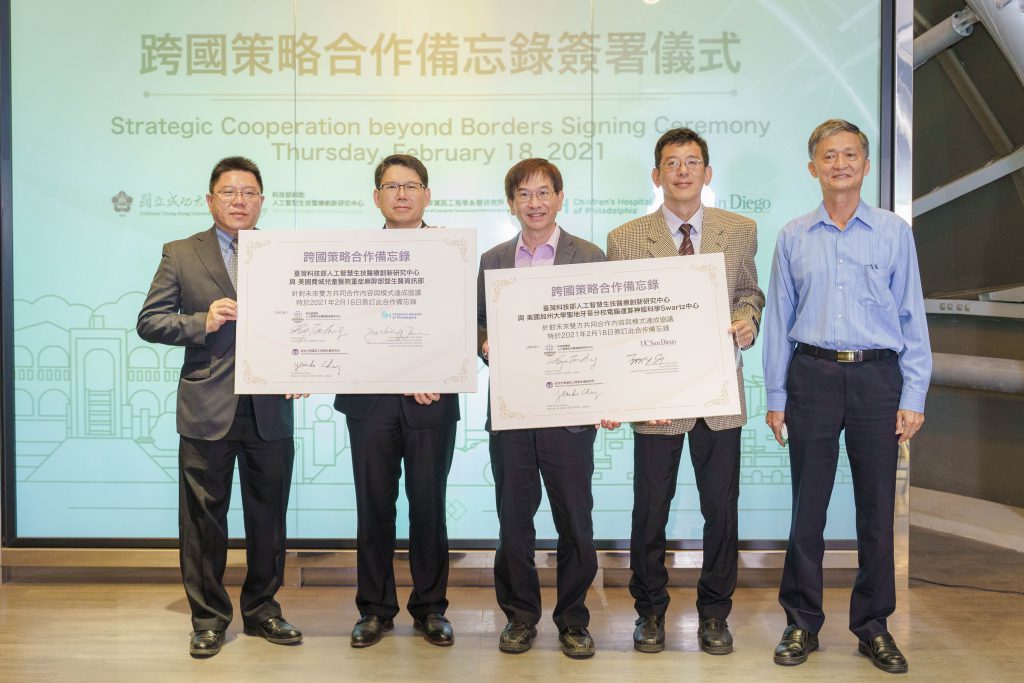
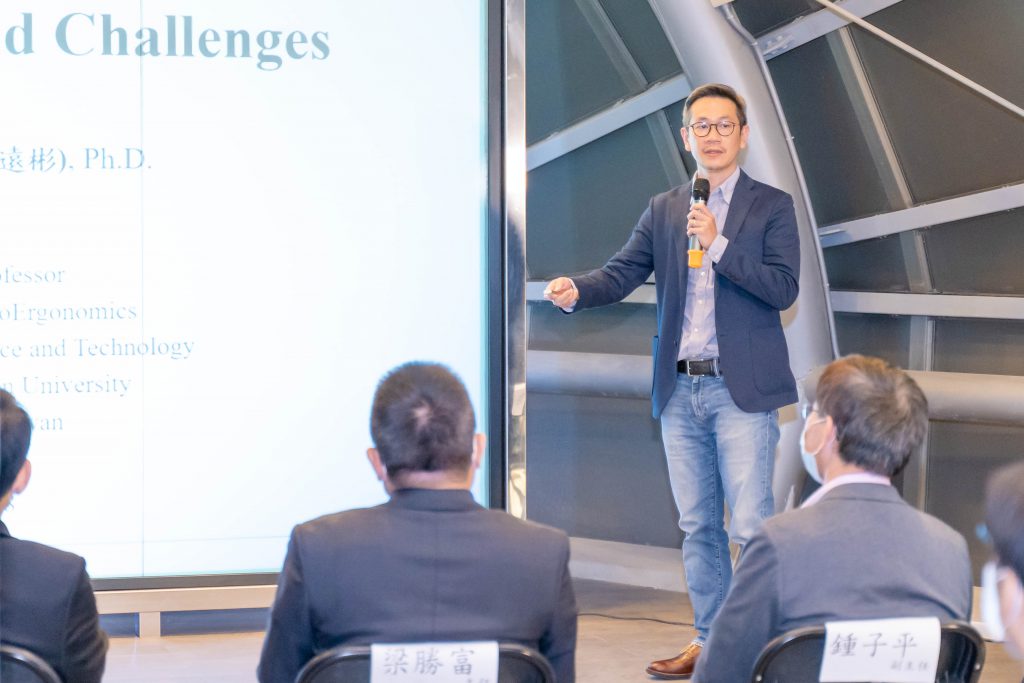
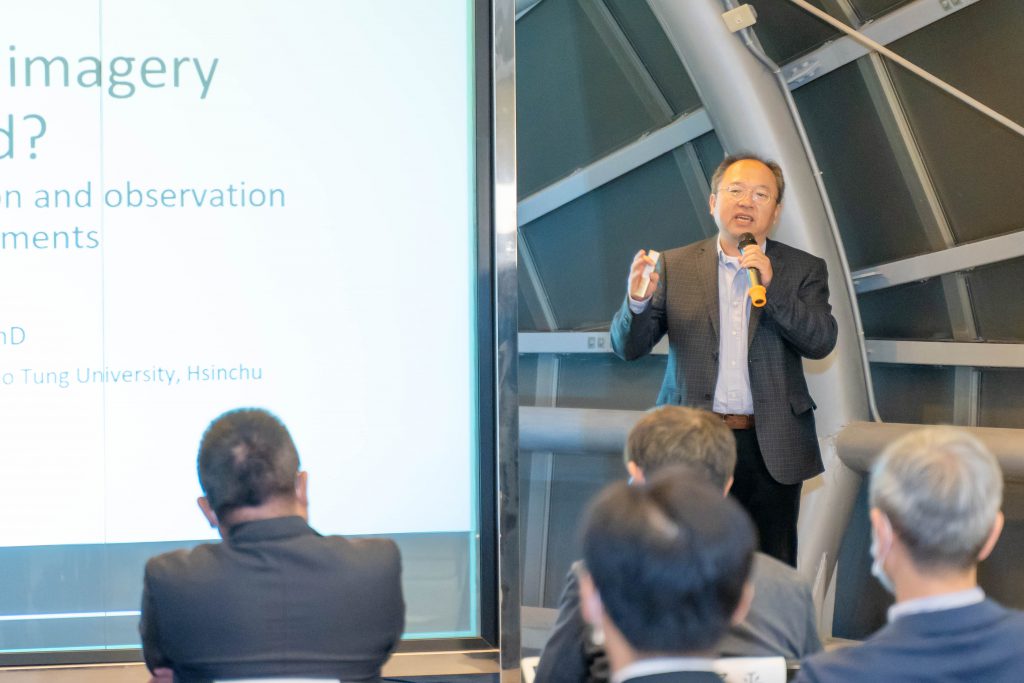
Special Talks were given by International BCI Master Prof. Tzyy-Ping Jung, Associate Director of the Swartz Center for Computational Neuroscience at UCSD, Associate Professor Jeng-Ren Duann from NYCU Institute of Education, and Associate Professor Yuan-Pin Lin from NSYSU Institute of Medical Science & Technology. They shared the latest developments in brain-computer interface technology as well as new methods combining AI technology to improve its performance and stability. MOST AIBMRC continually emphasizes its focus on AI biomedicine and biotechnology and hopes that the forum will allow participants to learn from the experts about the many possibilities in the field of brain-computer interfaces and AI.
VIP Guests in attendance included Wei-Chou Hsu, Dean of College of Electrical Engineering and Computer Science, Yeim-Kuan Chang, Chair of NCKU CSIE, Woei-Jer Chuang, Director of NCKU Innovation Headquarters, , Sun-Yuan Hsieh, Chief Executive Officer of NCKU Research and Development Foundation, Fu-Zhen Shaw, Dean of College of Social Sciences, Chou-Ching Lin, Chairperson of MOST Neurology Department, Yi-Shan Tsai, Director of NCKU Hospital Clinical Innovation and Research Center, and Cheng-Yu Lin, Director of NCKU Sleep Medicine Center. Center Director Sheng-Fu Liang stated that the goal of signing of a memorandum of cooperation between AIBMRC, University of Pennsylvania & Children’s Hospital of Philadelphia in the Eastern U.S. and UCSD in the Western U.S. is to nurture and cultivate top AI Talents, and expand upon opportunities for international research and clinical field studies. To provide the needs for the development of precision health and smart medical care, and to bridge research results with industry. AIBMRC strives to become an internationally recognized medical AI Hub.” In his speech, Dean Hsu said: “AI is making more contributions to mankind. I look forward to everyone present and our international partners to strengthen cooperation and research.” Director Chuang pointed out that “AI is basically interdisciplinary research. At this stage, it has combined the work of NCKU Hospital, the School of Electrical Engineering, and the Department of Information. The University of Pennsylvania, Perelman School of Medicine, Philadelphia Children’s Hospital and the UCSD Swartz Center for Computational Neuroscience are all important locations for AI development. This opportunity will connect the domestic energy accumulated across fields and countries to achieve a very important level of AI development.” Lastly, Director Chang said from the perspective of talent cultivation: “I hope we continue to nurture talents so the results of cultivation can continue. This international cooperation provides students with an amazing opportunity. I am very grateful for this project to make the research results of students at all stages advance by leaps and bounds!”
Multi-institution International Cooperation. Seizing opportunities for smart precision health.
Due to current Covid-19 regulations, the number of attendees at the venue will be limited. All events will be broadcasted live so anyone who is interested may participate virtually. Taiwan’s Ministry of Science and Technology sponsors AIBMRC to actively cultivate top AI talents and technological research & development through interdisciplinary, inter-institutional and international cooperation. With AI boosting all aspects, these efforts have blossomed in industry academia cooperation. Having the future development of AI biomedicine and biotechnology in mind, we’ve partnered with University of Pennsylvania’s Perelman School of Medicine and Children’s Hospital of Philadelphia and UCSD Swartz Center for Computational Neuroscience to actively improve the current need for international clinical field opportunities. International AI Talents would also have an opportunity to create and verify AI technology as well as apply these domestically developed technologies in an international clinical field setting. Advanced technology projects abroad may also see accelerated breakthroughs from these AI talents. Through cooperation, all aspects ranging from implementation, clinical verification, market regulations, international cooperation can be accelerated and also generate even more opportunities for future development in the field of Smart Precision Health. We believe this to be creating a new page in cultivating high level talents in AI biomedicine and biotechnology.
Due to current Covid-19 regulations, the number of attendees at the venue will be limited. All events will be broadcasted live so anyone who is interested may participate virtually. Taiwan’s Ministry of Science and Technology sponsors AIBMRC to actively cultivate top AI talents and technological research & development through interdisciplinary, inter-institutional and international cooperation. With AI boosting all aspects, these efforts have blossomed in industry academia cooperation. Having the future development of AI biomedicine and biotechnology in mind, we’ve partnered with University of Pennsylvania’s Perelman School of Medicine and Children’s Hospital of Philadelphia and UCSD Swartz Center for Computational Neuroscience to actively improve the current need for international clinical field opportunities. International AI Talents would also have an opportunity to create and verify AI technology as well as apply these domestically developed technologies in an international clinical field setting. Advanced technology projects abroad may also see accelerated breakthroughs from these AI talents. Through cooperation, all aspects ranging from implementation, clinical verification, market regulations, international cooperation can be accelerated and also generate even more opportunities for future development in the field of Smart Precision Health. We believe this to be creating a new page in cultivating high level talents in AI biomedicine and biotechnology.
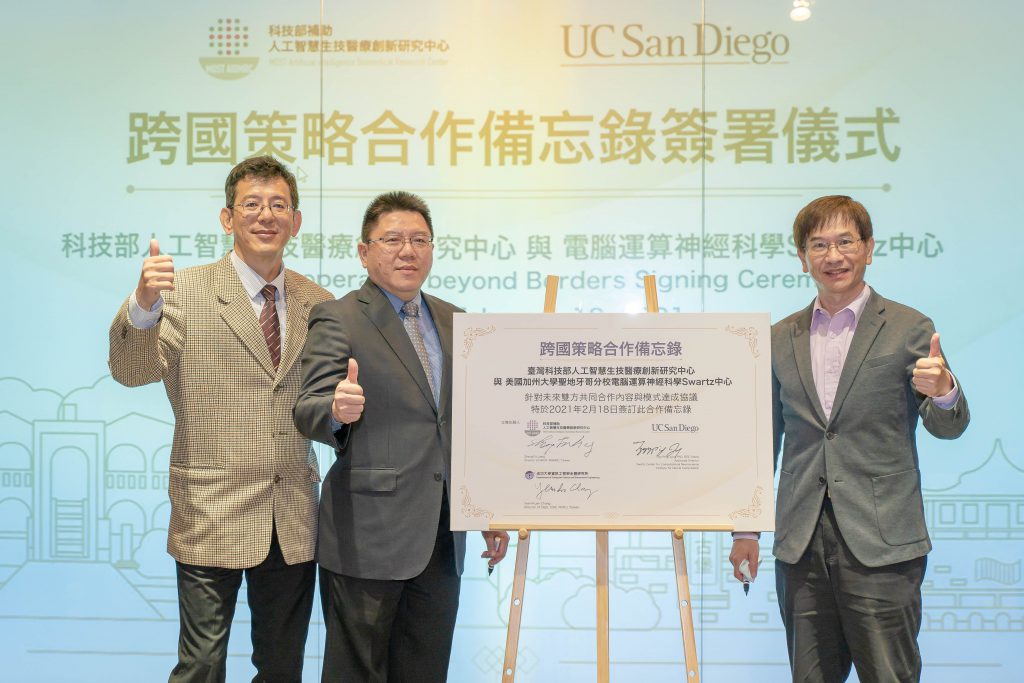
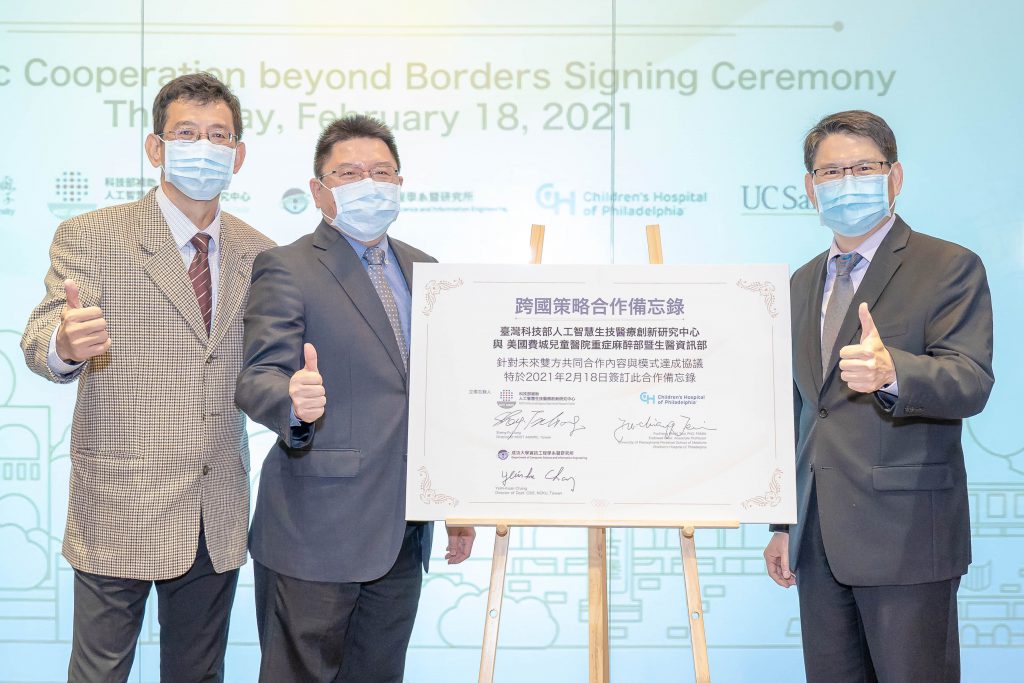
(left to right) CSIE Dept. Chair Yeim-Kuan Chang、AIBMRC Director Sheng-Fu Liang、UCSD Swartz Center for Computational Neuroscience Associate Director Tzyy-Ping Jung
(left to right) CSIE Dept. Chair Yeim-Kuan Chang、AIBMRC Director Sheng-Fu Liang、University of Pennsylvania & Children’s Hospital of Philadephia Associate Professor Fu-Chiang Tsui
